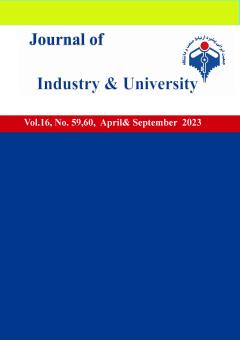شناسایی عوامل موثر بر ارزشگذاري استارتاپهاي مبتنی بر فناوري در مشهد
الموضوعات : جنرال لواء
حمید حیدری زاد
1
![]() ,
امیر غفوریان شاگردی
2
,
امیر غفوریان شاگردی
2
![]() ,
امید بهبودی
3
,
امید بهبودی
3
![]()
1 - کارشناسی¬ارشد مدیریت کسب وکار، دانشکده علوم اداری، دانشگاه بینالمللی امام رضا (ع)، مشهد، ایران
2 - دانشیارگروه حسابداری، دانشکده علوم اداری، دانشگاه بینالمللی امام رضا (ع)، مشهد، ایران.
3 - استادیار گروه مدیریت، موسسه آموزش عالی عطار، مشهد، ایران
الکلمات المفتاحية: ارزشگذاری, استارتاپ, فناوري, تحلیل دلفی,
ملخص المقالة :
هدف پژوهش حاضر شناسایی و اولویت بندی عوامل مؤثر بر ارزشگذاری استارتاپهای مبتنی بر فناوري شهر مشهد انجام است. تحقیق حاضر از لحاظ هدف کاربردی و از لحاظ نوع روش کیفی بوده که با الگوی دلفی انجام شده است. جامعه و نمونه آماری 20 نفر از اساتید و خبرگان با تخصص مدیریت و فعال در زمینه استارت آپها به روش نمونه گیری هدفمند انتخاب شدند. ابزار پژوهش پرسشنامه دلفی بوده که اعتبار آن نیز مورد بررسی و تایید قرار گرفته است. جهت تجزیه و تحلیل داده ها هم از روش تحلیل الگوی دلفی بهره گرفته شد. در ابتدا با مطالعه منابع 50 عامل در 8 بعد محوری (داشتن مدیریت متخصص، وجود دانش و تخصص لازم نیروی انسانی، زیرساخت فناورانه و اپلکیشنهای کاربردی، امنیت اطلاعات در شبکه استارتاپی، پشتیبانی مالی و قانونی، مالی و اقتصادی و موقعیت بازار) به عنوان عوامل مؤثر بر ارزشگذاری استارتاپهای مبتنی بر فناوري شناسایی شدند که طی سه مرحله دلفی در نهایت 45 عامل به اجماع خبرگان رسید و اولویت بندی شد. مهمترین عوامل مؤثر بر ارزشگذاری استارتاپهای مبتنی بر فناوری شهر مشهد عبارتند از قدرت چانه زنی مشتریان، انعطاف در تکنولوژی و فناوری، استفاده از دیتاهای درست در پیشرفت استارتاپ، هزینه تولید مجدد دانش فنی، ترکیب افراد با تخصصهای محوری مورد نیاز در تیم تجاری، موقعیت انحصاری بازار، آمادگی فناوری، تکنولوژی بالای بازار پسند، استفاده از دانش و اطلاعات بروز جهانی در ایدهپردازی و اجرا، حجم سرمایهگذاری مورد نیاز
Arab, A., Mohammad Reza, Ch., Mohammad Sharif, Sh., & Mohammad Baqer, G. (2020). Commercialization of knowledge based on the role of managerial ambidexterity in higher education. Karafan, 291-310, 2(18). (In persian)
Arbabi, P. (2017). Valuation of startups in the field of information technology-based companies, Master's thesis, Tehran University of Science and Culture. (In persian)
Ashtari Mehrjardi, A. (2018). A social study of the factors of the emergence and decline of start-ups in the country, Tehran: Research Center for Cultural and Social Studies. (In persian
Bandarian, R., & Mousai, A. (2015). Taking advantage of existing industries is a solution to facilitate commercialization. Roshd Fanavar Quarterly, 5(18). (In persian)
Behboodi, o. (2019). Designing a marketing dashboard template in Iran's tourism industry. PhD Thesis, Islamic Azad University, Shahrood, Iran. (In persian)
Borelli, J. (2019). Rebooting journalism: how media startups overcame the business model crisis. What can we learn from Eldiario. es and Mediapart?.
Cohen , R (2016). Entry regulation as a barrier to entrepreneurship. Financial Economics, 82, 591–629.
Deddy SUSHANDOYO,RETNA AYU MUSTIKARINI KENCANASARI, EKO AGUS PRASETIO, and YOSHIYUKI MATSUURA(2022). THE INFLUENCES OF TECHNOLOGICAL CAPABILITY AND MARKET ORIENTATION TOWARD BUSINESS MODEL INNOVATIONS OF DIGITAL STARTUPS. International Journal of Innovation Management, 26(2).
Ellingsen, O. (2017). Commercialization within Advanced Manufacturing: Value Stream Mapping as a Tool for Efficient Learning. Norwegian University of Science and Technology, Procedia CIRP, 60, 374–379.
Esfahanian, M. (2017). The influence of entrepreneurial leaders on the growth of startups, Master's thesis, Shahid Beheshti University. (In persian)
Fadai Fathabadi, M. (2016). Identifying and prioritizing factors affecting the success of start-ups in the entrepreneurial ecosystem of Iran, Master's thesis, Tabriz University. (In persian)
Farahmand, K., Daneshvar, M., Shahnoushi, N., Ghasemi, V., & Hemmati, A. (2012). Factors affecting market development of saffron using Fuzzy Delphi. Agricultural Economics, 6(3), 121-143. (In persian)
Faruzandeh, M., Fard, R., & Hamidizadeh, A. (2021). The application of the mixed approach in shaping the international entrepreneurial marketing model of fintechs (case study: Saderat Bank of Iran). Business Strategies, 18(17), 169-199. (In persian)
Fini, R., Grimaldi, R., & Meoli, A. (2020). The Effectiveness of University Regulations to Foster Science-Based Entrepreneurship. Research Policy.
Hosni, M. A., Shah Mansouri, A., & Bazaei, Q. A. (2021). Identifying the opportunities and challenges of block chain technology in the economy of industrial businesses. Economics and Business, 12(22). (In persian)
Hsu, Ch., and Sandford, BA. (2008). The Delphi technique: making sense of consensus. Available from: http://pareonline.net/pdf/v12n10.pdf.
Hsu, Chia-Chien, and Brian A. S. (2007). The Delphi Technique: Making Sense of Consensus. Practical Assessment, Research & Evaluation Journal, 21 (10): 1.
Keeney, S., Hasson, F., and McKenna, HP. (2001). A critical review of the Delphi technique as a research methodologyfor nursing. Int J Nurs Stud, 38(2): 195-200.
Kohraei, S., & Shivai, E. (2021). Investigating the effect of the development of knowledge-based companies and innovative start-ups in science and technology parks on the growth of the regional economy in Iran. Innovation Ecosystem, 1(2). (In persian)
Landeta J. (2006). Current validity of the Delphi method in social sciences. Technological Forecasting and Social Change, 73(5): 467-82.
Moro Visconti, R. (2019). The Valuation of Technological Startups. SSRN Electronic Journal. doi:10.2139/ssrn.3533876
Rahimi Klishadi, M. (2017). An introduction to the valuation of start-ups and new businesses, the 12th National Congress of Pioneers of Progress, Tehran. (In persian)
Tahirpur, H., & Tayibi Tolo, A. (2019) Relationship between customer relationship management (CRM) and marketing performance. Business Management Perspective, 1, 109-122. (In persian)


